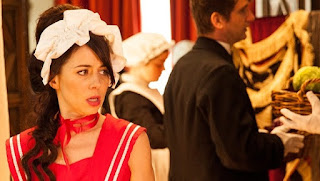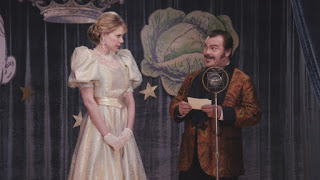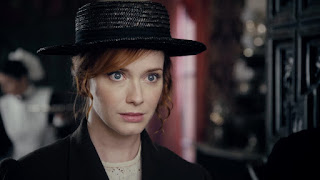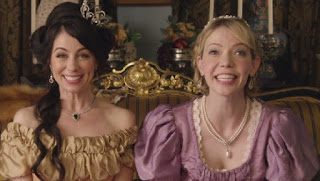Look, I long ago accepted that I was never going to be the kind of person who "gets" Downton Abbey. And I'm cool with that. I tried. Oh did I try. But for all my watching and paying attention and desperately trying to stay awake, I just couldn't do it. Period dramas about upper class people being upper class and having upper class problems bore me to tears. The only one I can think of that I got sufficiently into was Gosford Park, and that's pretty much just because there's a murder in it.
Right now it seems like our culture is kind of obsessed with the turn of the last century. We're looking back on all this Gilded Age stuff and lamenting, "Where did it all go? Why does no one have any class anymore?!"
And while I assume that they mean class as in nobility and propriety, I feel the need to point out that we still have classes. We do not live in a classless society. Anyone who thinks we do can come hang out on a private liberal arts college campus for a few hours and they'll see how clear the class divides still are.
Not that I hate Pride and Prejudice, mind you. More that my intolerance for people in fancy dresses pretending to be from ye olde times includes most adaptations of that book. I really happen to like The Lizzie Bennet Diaries for precisely it's avoidance of this and how it manages to show that the story in Pride and Prejudice is, in fact, timeless and can be seamlessly updated for our current mindset. There's nothing wrong with appreciating a story in its original context, but there is definitely something to be said for the quality of a story that can be placed in any time period and still make sense. But I'm getting off topic again.
I mention Pride and Prejudice specifically because yesterday, while I was in the bathroom at a friend's house getting my hair dyed raspberry pink, a bunch of my other friends were out in the living room watching the full BBC miniseries. The one with Colin Firth and Jennifer Ehle that everyone says is the absolute best but that I keep falling asleep during.
And I was thinking about this while I waited for the dye to set. Why do I hate period dramas so much? Why are my favorite historical pieces either revisionist history (Inglourious Basterds), wild parades of anachronism (A Knight's Tale), or full of murder and war (Gangs of New York)? Now, part of that can clearly just be put down to temperament. But I think a fair amount can also be credited to the fact that I don't find period dramas to be sufficiently realistic. Or rather, the more "realistic" a period drama is, the less I believe it.
The problem comes from the fact that period dramas are almost always made by people in the present. There's another subset here of period dramas made in the past, and those are ripe for interpretation, but here we're talking about the more recent stuff.
Period dramas made in the past twenty years or so, which are clearly made by modern people reinterpreting the social structures of people from the past. There's no way to be objective about that. None at all. None of us lived back then and none of us can even really talk to someone who did, not for the most part, and so our interpretations are based on the media that was produced back in those days.
Which is a problem. Media is not a particularly accurate reflection of society, especially a media that categorically excludes texts written by people of color and women. Jane Austen and the Brontes are exceptions, as is Alexandre Dumas, but it's worth pointing out that they're exceptions precisely because they were wealthy. They could afford to go against social convention and become writers. Other people weren't so lucky.
So by and large we tend to base our "historically accurate" interpretations of the past on texts that come from, frankly, dubious sources. They come from places and perspectives of privilege. For every 12 Years a Slave, there are a hundred Uncle Tom's Cabin-s. In other words, for every one story by a person from a marginalized group that managed to get through, there are a hundred more stories that are told about that marginalized group by people in power.
I have trouble watching period dramas because the whole time in my head I'm thinking, yeah, this might have been what it looked like from the outside back then, but I sincerely doubt that this is how it felt. That's why I like A Knight's Tale so much. All of the historical inaccuracy, the modern rock music, the way they treat jousting like a modern sport, it all actually makes it feel more like a story that could have really happened. I mean, it's not like we invented rebellion and modernity and feeling like you're on the cutting edge in the past fifty years. People have been complaining that the music "kids today" listen to is "just noise" since before Mozart.
A Knight's Tale works because it treats historical topics with an interpretation that helps us the audience understand what they would have felt like to the people living then. I seriously doubt that people from the past always felt like their world was slow and covered in moth balls. Everyone's present is cutting edge, and I like media that reflects that.
All of this is why I'm so incredibly happy to have found Another Period. A new sitcom from Comedy Central, the show is a mush of genres. Very Downton Abbey meets Real Housewives. For reals. It's amazing.
The show follows Lillian Schmemmerhorn-Fish (Natasha Leggero) and Beatrice Downsy (Riki Lindhome), two daughters of the incredibly wealthy Bellacourt family in Newport, Rhode Island. For those of you who managed to miss this bit of history class (lucky you), at the turn of the century, Newport was where all of the truly obscenely wealthy people of the time built their houses. Robber barons, captains of industry, the kind of people who wrecked the economy and led to the Great Depression, they all lived in Newport. And that's where the Bellacourts live.
The Bellacourts aren't new money, but they're also not as upper class as they want to be. Entitled, whiny, and generally horrible, Lillian and Beatrice manage to skewer a lot of our ideas about how wonderful it would have been to live in the turn of the century and have a Downton Abbey-esque existence.
For starters, the show makes it incredibly clear that if you aren't obscenely wealthy, your life is awful. One of the main supporting characters is a new housemaid, Chair (Christina Hendricks). Well, technically her name is Celine, but that's too fancy a name for a servant, so the family renames her Chair. Not only is Chair's job horrible and demeaning - her duties include transporting buckets of poop half a mile to be tossed in the ocean, as well as administering morphine to the Bellacourt children - it's also openly stated that it's the best job she can get. If she plays her cards right, in twenty years she could be promoted to assistant housekeeper. But only if the current assistant housekeeper, Blanche (Beth Dover) dies or is institutionalized again.
And when Blanche says that she might just quit and get another job all of the servants laugh uproariously. Where? Doing what? Being a prostitute? Nope, Blanche says she's going to get a job in a factory, and that just leads to more laughter. While the scene is openly supposed to be exaggerated and silly, it's also a harsh look at what it means to live as a poor person in this society.
Meanwhile, Lillian and Beatrice eat bald eagle and toast points and drink "cocaine wine" and try to weasel their way onto the "Newport 400". At one point Lillian and Beatrice convince their husbands to fake their own deaths so that they can marry again. Later they enter a beauty pageant where they have to compete against babies and heads of cabbage to be named "Newport's Most Beautiful".
In other words, it's a deeply silly show. The characters talk to the camera, there's lots of very self-referential music cues, and the whole thing is written in such a way that you can't ignore the hypocrisy and ludicrousness of thinking it would have been better to live in the early 1900s.
But that's not my favorite thing about it.
My favorite part of this show is how, by making it all feel very modern and real, and by making us laugh at the petty indecencies of these characters, we are forced to reckon with our own history. "Look at it!" the show is saying. "Look at how actually horrible it was back then! This is how it felt to the characters living then. They didn't feel old or out of touch. They didn't feel cool and reserved. This was their world. And their world was messed the hell up."
I do think there's value in movies and shows like the 1990s Pride and Prejudice, but I think we have to look at them with a grain of salt. They're not real. Another Period isn't real either, but that's easier to see. We have to remember that any historical or period fiction produced now is inherently going to have our modern perspective inextricably wound in. There's no getting around that.
What we have to do is remember that people in the past were people too. They were petty and cruel and frustrated and not actually all that proper most of the time. Yes, there were social strictures and manners and all that, but there was always an old guard claiming that the youth were "ruining the country". There were always social climbers and illegitimate children and really awful dinner parties. There were always issues of race and class and gender. The past is not an ideal country. It's our past. It's where we came from. Obviously it's screwed the hell up.
Maybe the solution is this: You keep your Pride and Prejudice and I'll keep my Another Period, as long as we both agree that they aren't true. They aren't accurate. As long as we both understand that these are fictional interpretations of long past events and that both are fantasies built by our modern times, I think I can handle that.
 |
| Shoutout to Hortense for being hilarious. |







This show sounds great. You said,
ReplyDelete"Jane Austen and the Brontes are exceptions, as is Alexandre Dumas, but it's worth pointing out that they're exceptions precisely because they were wealthy."
I think there's a further problem, and that's that people who make adaptations of historical novels set about making "period drama" with very particular ideas of what that should look like. Wuthering Heights becomes a romance in the heather as opposed to a story of obsession, cruelty and self-destruction. I've seen people dismiss Jane Austen as being "all bonnets and lace" because that's what they see in the shows. They've tried to go historical-gritty with the most recent Three Musketeers here in the UK, so instead of a great adventure it's a bawdy, violent mess.
I could also rant about early twentieth century novels which are now televised with all the male sexual ambiguity taken out and replaced by macho straightness and camp gayness... but yeah, historic writers were universally privileged, however faithful adaptations would have a great deal more to offer.
That's totally true! I always think of it in terms of Shakespeare. You know, how everyone puts on Shakespeare plays as "high art", which is cool because they are really good, but they gloss over how these were actually the pop culture of the time and are positively riddled with poop humor and dick jokes. Like, it's okay to admit that low culture has value. You don't have to rewrite history and ignore the elements of media that don't fit your rarified view of the past.
DeleteGrarg.
Though I do have to admit that I really enjoy the BBC's current Musketeers. Accurate? No. But fun as hell, and I feel like it really fits with the spirit of the books.
You're absolutely right about Shakespeare and in fairness, I didn't stick with Musketeers - I went all curmudgeonly about a book I love. I should perhaps give it a second glance if you feel it fits with the spirit.
DeleteYour mileage may vary, but I do really like how the show turned out.
DeleteDid I misunderstand you or did you say the Bronte sisters and Jane Austen were wealthy? I'm pretty confused about this statement. They weren't poor but they weren't rich. Also women that didn't marry usually ended up living with family or had to live poorly on their own, maybe I'm confused. I do belong to a historical regency period society that studies history constantly, though I respect your opinion, it seems to me that you come from a modern point of view. Have you read the books? The books have a huge impact on the acting in these types of movies. They can describe one scenery in like 5 pages so it's pretty elaborate to cram it all in one movie. Hence why the BBC 90's version of pride and prejudice is so long. Anyway, I guess I just didn't completely understand.
ReplyDeleteYup, they're incredibly influential. And I have read the books. I just...don't get them. Or rather, I get them, but I prefer them when translated into a more modern context, a form of communication that I feel does justice to the tone of the work.
DeleteBut, to each their own.
ESCORTS SERVICES
ReplyDeleteINTERNATIONALSEX GUIDE KOLKATA
CALL GIRLS NEAR ME
CALL GIRLFRIEND RELATIONSHIP
ESCORT SERVICES
KOLKATA SEX
CALL GIRL IN KOLKATA
ESCORT SERVICE IN KOLKATA
GIRLS WHATAPP NUMBER
ONLINE GIRLS
FEMALE ESCORTS
FEMALE ESCORT
CALL GIRL NAME AND MOBILR NUMBER
CALL GIRL KOLKATA
ESCORTS SERVICE
MASSAGE IN KOLKATA
GIRLS PHONE NUMBER
INDIAN MASSAGE PARLOUR SEX
ESCORTS SERVICES
CALL GIRLS NO
CALL GIRLS KOLKATA
BEAUTIFUL SEXY GIRLS
ESCORT KOLKATA
ESCORTS KOLKATA
ESCORT IN KOLKATA
ESCORTS IN KOLKATA
COLLEGE GIRL HOT
ESCORT SERVICE KOLKATA
KOLKATA VIP ESCORTS
KOLKATA HIGH PROFILE ESCORTS
KOLKATA COLLEGE ESCORTS
KOLKATA INDEPENDENT MODEL ESCORTS
KOLKATA CALL GIRLS ESCORTS
KOLKATA CHEEP ESCORTS